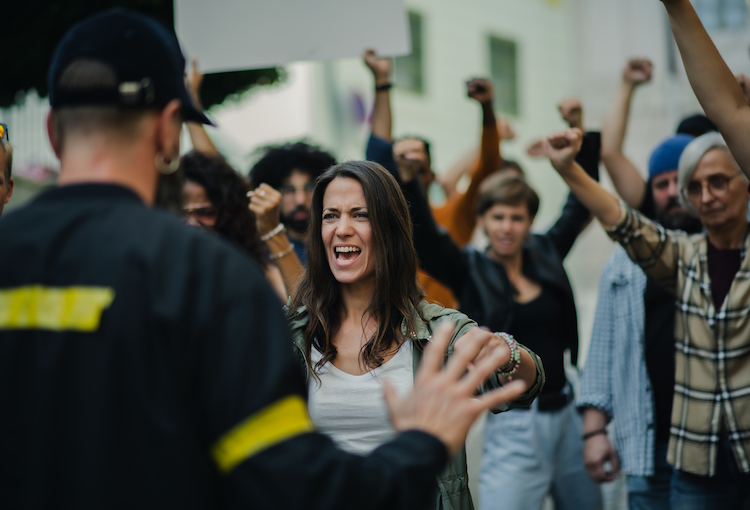SCOTUS to Consider Obstruction Statute at Issue in Jan. 6 Prosecutions

The U.S. Supreme Court recently granted certiorari in Fischer v. United States. The case challenges the D.C. Circuit Court of Appeals’ interpretation of a federal statute prohibiting obstruction of congressional inquiries and investigations. The law has been used in theprosecutions of numerous defendants charged in connection with the Jan. 6 attack on the Capitol, including former President Donald Trump.
Facts of the Case
The key issue before the Courtis whether individuals who allegedly assaulted law enforcement officers while participating in the Capitol riot can be charged with corruptly obstructing, influencing, or impeding an official proceeding, in violation of18 U.S.C. § 1512(c)(2). The statute provides: “Whoever corruptly—(1) alters, destroys, mutilates, or conceals a record, document, or other object, or attempts to do so, with the intent to impair the object’s integrity or availability for use in an official proceeding; or (2) otherwise obstructs, influences, or impedes any official proceeding, or attempts to do so, shall be fined under this title or imprisoned not more than 20 years, or both.”
Joseph Fischer was charged by indictment with various offenses arising from their alleged participation in the Capitol riot on January 6, 2021, including obstructing an official proceeding under Section 1512(c)2. U.S. District Judge Carl J. Nichols of the District of Columbia dismissed the 1512(c)2 charges, agreeing with Fisher that the statute is exclusively directed to crimes related to documents, records, or other objects.
D.C. Circuit’s Decision
The D.C. Circuit reversed. It held that Section 1512(c)(2) encompasses all forms of obstructive conduct and is not limited to obstructive conduct with respect to “a document, record, or other object” or to “general evidence impairment.” According to D.C. Circuit Judge Florence Pan, “That natural, broad reading of the statute is consistent with prior interpretations of the words it uses and the structure it employs.”
Judge Gregory Katsas dissented. “Because my colleagues reject an evidence-focused interpretation of section 1512(c) and instead adopt the government’s all-encompassing reading, I respectfully dissent,” he wrote.
Issues Before the Supreme Court
Fisher appealed to the Supreme Court, arguing that “[t]he D.C. Circuit’s opinion conflicts with this Court’s precedent, diverges from the construction of Section 1512(c) by other courts of appeal, and results—as Judge Katsas observed—in an ‘implausibly broad’ provision that is unconstitutional in many applications.” The Court granted certiorari on December 13, 2023. The justices have agreed to consider the following question:
Whether the U.S. Court of Appeals for the District of Columbia Circuit erred in construing18 U.S.C. § 1512(c), which prohibits obstruction of congressional inquiries and investigations, to include acts unrelated to investigations and evidence.
Oral arguments have not yet been scheduled but are likely to take place in the spring of 2024. A decision is expected by the end of the term in June.
Previous Articles
SCOTUS Decision in Bowe v. United States Is First of the 2026 Term
by DONALD SCARINCI on February 5, 2026
In Bowe v. United States, 607 U.S. ___ (2026), the U.S. Supreme Court held that Title 28 U.S.C. § ...
SCOTUS Rules State Can’t Immunize Parties from Federal Civil Liability
by DONALD SCARINCI on January 29, 2026
In John Doe v. Dynamic Physical Therapy, LLC, 607 U.S. ____ (2025) the U.S. Supreme Court held that...
Supreme Court to Address Racial Discrimination in Jury Selection
by DONALD SCARINCI onWhile the U.S. Supreme Court has concluded oral arguments for the year, it continues to add cases t...
The Amendments
-
Amendment1
- Establishment ClauseFree Exercise Clause
- Freedom of Speech
- Freedoms of Press
- Freedom of Assembly, and Petitition
-
Amendment2
- The Right to Bear Arms
-
Amendment4
- Unreasonable Searches and Seizures
-
Amendment5
- Due Process
- Eminent Domain
- Rights of Criminal Defendants
Preamble to the Bill of Rights
Congress of the United States begun and held at the City of New-York, on Wednesday the fourth of March, one thousand seven hundred and eighty nine.
THE Conventions of a number of the States, having at the time of their adopting the Constitution, expressed a desire, in order to prevent misconstruction or abuse of its powers, that further declaratory and restrictive clauses should be added: And as extending the ground of public confidence in the Government, will best ensure the beneficent ends of its institution.





